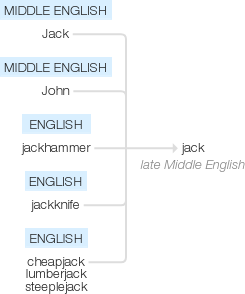Jack
late Middle English: from Jack, pet form of the given name John . The term was used originally to denote an ordinary man (jack1 (sense 6)), also a youth (mid 16th century), hence the ‘knave’ in cards and ‘male animal’. The word also denoted various devices saving human labour, as though one had a helper (jack1 (sense 1, sense 3, sense 9, sense 10), and in compounds such as jackhammer and jackknife); the general sense ‘labourer’ arose in the early 18th century and survives in cheapjack, lumberjack, steeplejack, etc. Since the mid 16th century a notion of ‘smallness’ has arisen, hence jack1 (sense 4, sense 5, sense 7, sense 13).
wiktionary
From Anglo-Norman jacke, Middle French jaque, jacque, from jacques(“peasant”), from the proper name Jacques. Compare jacquerie.
Transferative use of the personal name Jack.
From Portuguese jaca(“jackfruit”), from Malayalam ചക്ക(cakka).
This etymology is incomplete. You can help Wiktionary by elaborating on the origins of this term.
etymonline
Jack
masc. proper name, attested by 1218, probably via Anglo-French Jake, Jaikes, from Old French Jacques (which was a diminutive of Latin Jacobus; see Jacob), but in English the name always has been regarded as a familiar form of John, and some have argued that it is a native formation. In Middle English spelled Jakke, Jacke, etc., and pronounced as two syllables ("Jackie").
In England, Jack became a generic name applied familiarly or contemptuously to anybody (especially a young man of the lower classes) from late 14c. Later used especially of sailors (1650s; Jack-tar is from 1781); Jack-ashore (adj.) "drinking and in high spirits, recklessly spending" (1875) also is an image from sailors (1840 as a book title). In U.S., as a generic name addressed to an unknown stranger, attested from 1889. Every man Jack "everyone" is from 1812. Also see jack (n.).
Used in male personifications from 15c.; first record of jack-of-all-trades "person handy at any kind of work or business" is from 1610s; Jack Frost is from 1826; Jack-nasty "a sneak or sloven" is from 1833 (Jack-nasty-face, a sea-term for a common sailor, is from 1788). Jack Sprat for a small, light man is from 1560s (his opposite was Jack Weight). Jack-pudding "comical clown, buffoon" is from 1640s. Jack-Spaniard is from 1703 as a Spaniard, 1833 as "a hornet" in the West Indies. Other personifications listed in Farmer & Henley include jack-snip "a botching tailor," Jack-in-office "overbearing petty official" (1680s), Jack-on-both-sides "a neutral," Jack-out-of-doors "a vagrant" (1630s), jack-sauce "impudent fellow" (1590s).
The U.S. plant jack-in-the-pulpit (Indian turnip) is attested by 1833. Jack the Ripper was active in London 1888. The Scottish form is Jock (compare jockey (n.)). Alliterative coupling of Jack and Jill is from 15c. (Iakke and Gylle, Ienken and Iulyan). Jack Ketch for "hangman, executioner" (1670s) is said to be from the name of a public executioner in the time of James II (compare Derrick); it also was used as a verb meaning "to hang."
jack (n.)
late 14c., jakke "a mechanical device," from the masc. name Jack. The proper name was used in Middle English for "any common fellow," and thereafter extended to various appliances which do the work of common servants (1570s). Also used generically of male animals (1620s, see jackass, jackdaw, etc.).
As a portable contrivance for raising weight by force from below, 1703. As the name of a device for pulling off boots from 1670s. The jack in a pack of playing cards (1670s) is in German Bauer "peasant." Slang meaning "money" is by 1890 (in earlier slang it meant "a small coin"). Jack-towel, one sewn together at the ends round a roller, is from 1795. The jack of Union Jack is a nautical term for "small flag at the bow of a ship" (1630s) and perhaps is from the word's secondary sense of "smaller than normal size."
jack (v.)
1860, jack up "hoist, raise, lift with a jack," American English, from jack (n.) in the appliance sense. Figurative sense "increase (prices, etc.)" is 1904, American English. Related: Jacked; jacking. Jack off (v.) "masturbate" is attested from 1916, probably from jack (n.) in the old slang sense of "(erect) penis."
